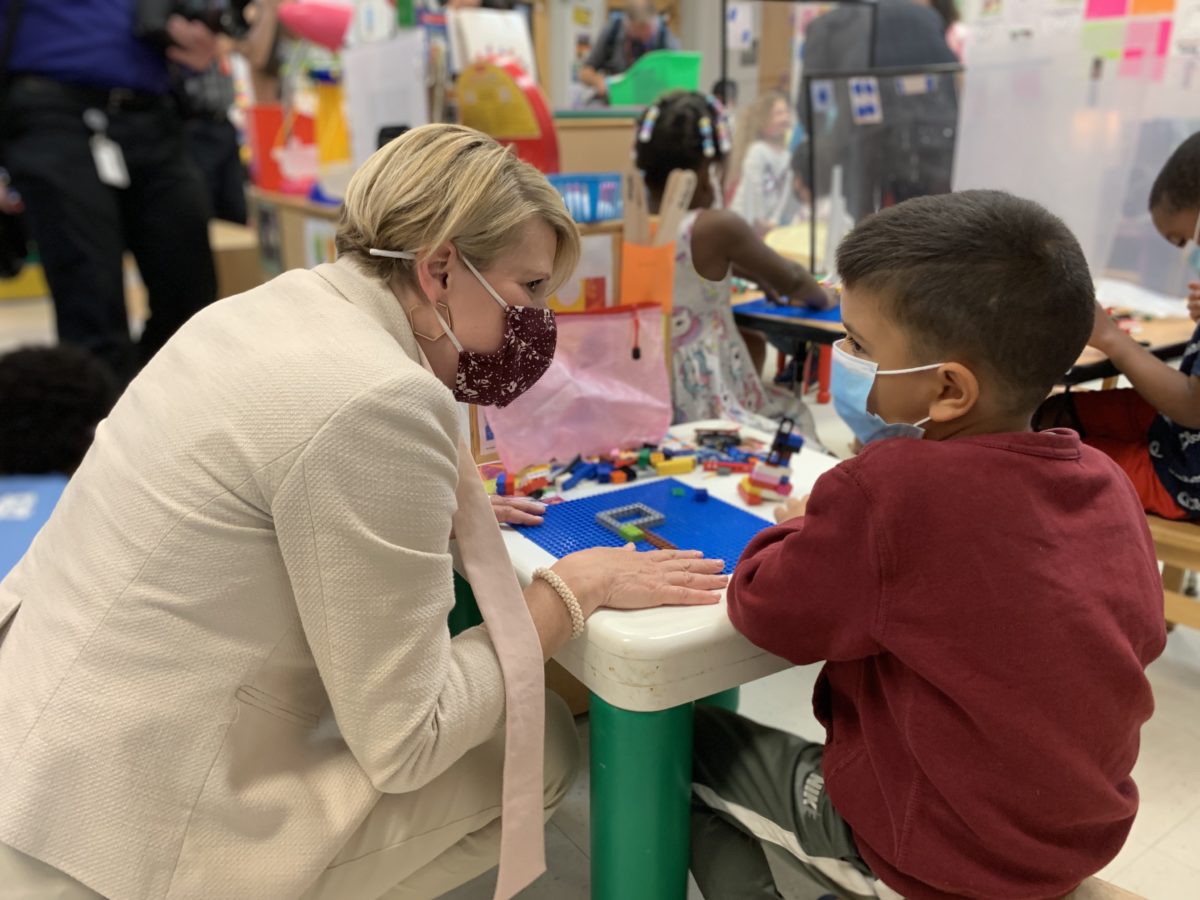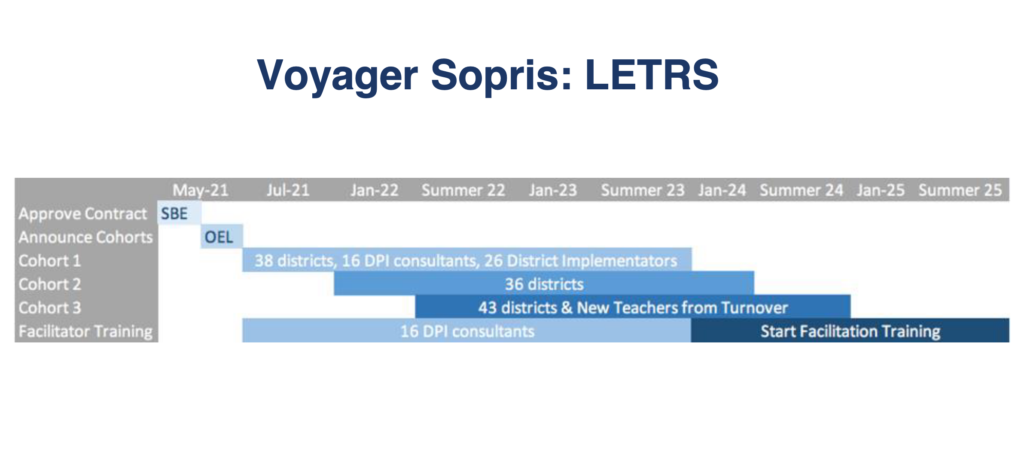

|
|
Educators in 38 North Carolina school districts will begin training in research-based reading instruction next month as the Department of Public Instruction begins implementing a new reading law enacted in April.
DPI gave the State Board of Education an update Thursday on its plan to implement the Excellent Public Schools Act of 2021, a bill championed by Senate President Pro Tem Phil Berger, R-Rockingham, that modifies the state’s Read to Achieve program. DPI also announced a three-year contract with Amplify Education Inc. to use its mCLASS product to assess students’ reading skills.
“Literacy is a huge priority for this administration, for this Board, for the General Assembly, and for the Governor’s Office,” State Superintendent of Public Instruction Catherine Truitt said. “We are all on the same page when it comes to ensuring that all children in our state learn to become proficient readers by third grade.”
Implementation of the new reading law
The Excellent Public Schools Act comes as third-grade reading proficiency has stagnated around 57%. State leaders and advocates blame ineffective reading strategies and lack of teacher training in instruction methods that are supported by decades-old research, referred to in the new law as the science of reading.
The law calls for training for NC Pre-K and elementary school teachers using funds allocated under a COVID-19 relief law.


Three cohorts, each with 36 to 43 districts, will receive training through a professional learning solution called Language Essential for Teachers of Reading and Spelling (LETRS). The training lasts two years for each group, with the first cohort completing it by spring 2023 and the final cohort finishing by spring 2024.
Districts were selected for cohorts based on several factors, such as their eagerness to start early and DPI’s desire to give priority to low-performing and Leandro districts.
Additional steps DPI and the State Board of Education are taking to implement the law include:
- Developing new statewide literacy instruction standards. The State Board has to report the standards to the Joint Legislative Oversight Committee by May 15, 2022, and to local boards of education by June 30, 2022.
- Developing a statewide literacy implementation plan for the new state standards. DPI must deliver this implementation plan to local boards of education by June 30, 2022.
- Establishing an Early Literacy Program at DPI. This team is tasked with ensuring that NC Pre-K students build strong foundational early literacy skills. By Sept. 15, 2022, DPI must report to the Joint Legislative Oversight Committee on the establishment of an Early Literacy Program and participation by NC Pre-K educators in literacy training.
- Assisting districts and charters to develop literacy curriculum and instruction aligned with the new standards. Each district and charter school will provide DPI an explanation of its literacy curriculum and instruction by Dec. 15, 2022. DPI’s regional case managers will then work with districts and charters to ensure that statewide standards are implemented at the local level, providing guidance on any needed modifications by Nov. 15, 2023. All curriculum and instruction at the local level must be in place beginning with the 2024-25 school year.
- Providing coursework in the science of reading for all teacher candidates at educator preparation programs (EPPs). Higher education institutions seeking approval or renewal from the state as educator preparation programs on or after July 1, 2022, will need to comply with this.
“Our superintendent is also rallying for us for long-term coaches out in the field,” said Amy Rhyne, director of the Office of Early Learning at DPI. “Our district implementers, if you will, similar to the Mississippi model. [They would] only focus on science of reading support and coaching, because we can provide the training — but the minute you step away, who’s going to continue to coach?”
State returns to mCLASS for reading assessments
Rhyne said the selection of mCLASS, which the State Board voted to approve, was the result of a request-for-proposal (RFP) process that included review of more than 6,000 pages of documents and 15 hours of vendor demos. The contract with Amplify, a former state vendor, is worth $14.5 million over three years.
Diagnostic assessment vendors have been in the news since 2018, when former superintendent Mark Johnson announced a contract with Istation, switching from Amplify. Many parents and teachers expressed concerns with changing platforms, and Amplify filed a protest, claiming that Johnson tried to influence the evaluation committee’s process. The contract with Istation was delayed and, ultimately, the State Board approved five vendors that districts could choose from for this school year.
In her presentation to the State Board, Rhyne said outside advisory agencies selected the members of an RFP team that included nine voting members and 18 non-voting members, who advised as content experts. Voting members included six practicing educators from districts and three from DPI.
Before looking at vendor proposals, the team considered the new reading law and its mandates. In addition to whether proposals conformed to state legal requirements, the RFP team considered cost, vendor stability, and references.
“As we moved forward in that process, it became very clear there was one that stood out,” Rhyne said. “We rated individually, together as a group — it was very clear.”
The RFP team considered continuation of this year’s multi-vendor solution, but worried about delays from coordinating with separate vendors and confusion from different data sources.
“I know that many of our districts have enjoyed the ability to have flexibility in selecting a tool,” State Board Vice Chair Alan Duncan said. “The problem is, from the legislation we are charged with being able to develop statewide data, and with a multiplicity of tools you’re not able to put together statewide data in a comprehensive form.”
One of the criticisms of mCLASS in the past was that it prompted students in “cueing” during assessments, a practice where students are prompted to figure out a word based on a picture or other context. The reading research does not support use of this practice when students are working on word recognition.
Another issue was that after students took the diagnostic, mCLASS would suggest leveled reading books. Leveled readers are books rated by difficulty. Critics say these books encourage guessing at words and also limit students’ ability to learn new words.
Rhyne said mCLASS eliminated both of these practices from its assessment under the contract.



